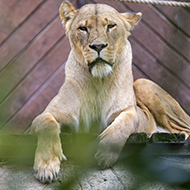Colchester Zoo announces death of lioness

"Naja was truly one of a kind" - Emma, carnivore team leader at Colchester Zoo.
Colchester Zoo has confirmed the death of Naja, a lioness who lived in the Lion Rock enclosure.
Naja, who lived with her cousin Bailey, a male lion, was euthanised on 4 March 2022 after her health rapidly deteriorated.
The Animal Care Team noticed that Naja wasn't feeling well, and she underwent a full veterinary examination, which revealed that she had severe heart disease and a possible thrombosis.
Two days later, Naja deteriorated and was unable to be stabilised, so the Animal Care Team made the difficult decision to have Naja euthanised.
In a statement online, Colchester Zoo said: “It’s always hard losing one our animals and it’s even harder when that animal has become a big personality within the Colchester Zoo family.
“Not only will all the staff at Colchester Zoo miss Naja, but she also leaves behind our male lion, Bailey. Bailey and Naja were cousins along with Naja’s sister, Malika, who passed away back in 2020.
“All three lions had a strong bond, with the bond between Bailey and Naja made even stronger with the loss of Malika. Naja arrived at Colchester Zoo in 2010, along with Bailey and Malika, and since became a firm favourite amongst visitors with many photographers capturing her spirit on camera.”
Emma, the carnivore team leader at Colchester Zoo, commented: “Naja was truly one of a kind. Her personality and character set her aside from any other animal we’ve had the pleasure to work with.
“Naja had a gentle side where she would interact with her keepers but very quickly changed when food was available! It never gets any easier losing an animal you’ve cared for and Naja will be sorely missed by the team! Our main priority now is to make sure Bailey adjusts to life on his own.”



 Zoetis has launched a new survey to identify management techniques for Equine Herpes Virus (EHV).
Zoetis has launched a new survey to identify management techniques for Equine Herpes Virus (EHV).